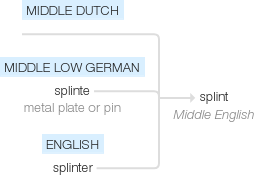Splint
Middle English (in splint (sense 2 of the noun); also denoting a section of armour): from Middle Dutch, Middle Low German splinte ‘metal plate or pin’; related to splinter.
wiktionary
From Middle English splint, splent, splente, from Middle Low German splinte, splente or Middle Dutch splint, splinte. Cognate with Old High German splinza(“bar, bolt, latch”). All ultimately from Proto-Germanic *splintǭ, *splintō(“piece of wood, splinter”), from Proto-Germanic *splint-, *splind-(“to split”), from Proto-Indo-European *(s)pley-(“to split, splice”).
etymonline
splint (n.)
c. 1300, "overlapping plate or strip in armor" (made of metal splints), probably from Middle Low German splinte, splente "thin piece of iron," related to Middle Dutch splinte "splint," probably literally "thin piece cut off," and from a Germanic offshoot of PIE *(s)plei- "to split, splice" (see flint). Cognate with Danish splint "splinter," Swedish splint "wooden peg, wedge." Meaning "slender, flexible slip of wood" is recorded from early 14c.; specific surgical sense is attested from c. 1400.
